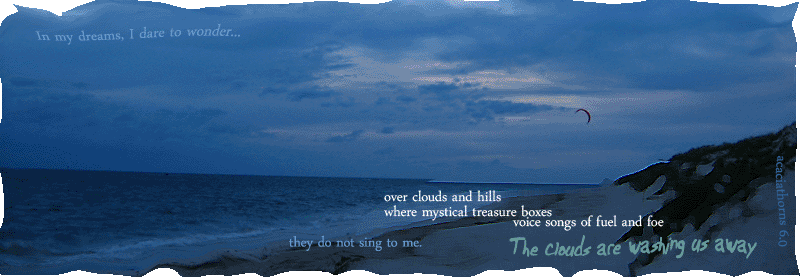There is an idea of a world that flows into itself. An idea that there is a machine which makes a machine which makes a machine which makes a machine... and somewhere along the line, we come back to the first machine. Or the machine that makes another copy of itself.
But somehow we try and rationalise this replication. We place linear constraints, labels to define and differentiate along lines we scarcely understand. Our perception is limited by our attempts to rationalise and thus our attempts to rationalise are limited by a narrowed perception. How then does change occur? How do we leap out of this hermeneutic circle?
Models of evolution have always been based by linearity. Marxist revolutionary thought filters through the seams of change, and thus our understanding of it is also limited. Is change relative to the individual circumstance? Is individual agency the only possible response to this hermeneutic understanding? If a society remains unaffected by external factors, will it change?
Perhaps it is that which remains the problem, the idea that the future does not construct the present: the idea of linearity pervading through our discourse, our understanding. If the future constructs the present and the present constructs the future and the past constructs the future, then we could understand how agency can work. This does not mean that society is based on fate; the terms of past, present and future mean nothing then, and thus the linearity model fractures and crumbles upon the ground. Everything is intertwined.
Call it the collective unconscious, the Jain concept of Kevalgnan, the idea of Derrida's 'Other'. There is much more than more. Reality has no face other than hyperreality. The hyperreal is hyperreal. Where does the circle stop? Is it even a circle? Am I limiting it to a circle?
Endless streams slip through cracks in the dry drought-covered land, and thought once again is categorised and forgotten.
Saturday, 15 March 2008
Where does the circle stop?
Scribbled by
Timystic
at
01:55
|
1 Whispers
![]()
Labels: plights and ponderings
Thursday, 13 March 2008
The Ridiculous Adventures of Uccle and Onion I
En garde, you minions of Uccle Onion!
It has come to my attention, due to a ridiculous amount of letters, emails, phone calls, text messages, little bird songs, dreams, reflections, unwanted thoughts, propaganda, facebook groups, et cetera, et cetera, et cetera, that members of UCL union (onion), upset with the fact that they can no longer wear camouflage at Fresher's Fayre and that UCL (Uccle) may suddenly have to be buddy-buddy with Palestine (slightly, maybe), have decided that the AGM at which these barbaric proposals were passed was certainly undemocratic. Of course, they were the prime example of civilised behaviour and treated the Chair and those who held those motions in utter respect. Of course- they're the civilising group at our respectful organisation.
In fact, they are so civilised that they would never let these barbaric propagators of such foolishly considerate proposals live amongst their good breed- so they used the opportunity to ethnically cleanse themselves of Sam Godwin- why need a reason when the majority of the student population supports a false idea anyway?
Thus, in this fantastic episode of Uccle and Onion we have learnt:
(i)you can never mess with the Onion- it is the Right(-winged) civilising pure authority.
(ii)that nobody ever gets a fair share of onion (but then, do you really want to?).
(iii)Uccle will always be run by an onion whose individuals care more about if they're following the right fashion (and other self-obsessive concrens) than for the welfare and concern of other people (they're barbaric- do they even count? Pfft!)
----
Edit [17/03/2008]- I know you're reading this because someone found it on Google blog search. If you so suddenly curious about a rather rubbish piece of writing why not dare to leave a comment? It's not like this is anything new or exciting.
Scribbled by
Timystic
at
03:07
|
0
Whispers
![]()
Labels: adventures, political meanderings
Friday, 7 March 2008
Book Input.
I am deprived of fiction. That does not mean that I have not spent the last week or so rereading Harry Potter in light of 'racialisation, ethnicisation and national consciousness' but that somehow any academic reading of fiction does not allow it to be fiction.
On my shelf sits a few books kindly lent a certain Sorceror, but somehow the length of American Gods, Perdido Street Station and Jonathon Norrell and Mr Strange is off-putting; not that length has ever been a problem, just that it's not easy to lug a book of those proportions around London. There is also the matter of 8000 words (now 6800!) which need to be written. Hmph.
Suggestions of decent fiction are welcome. In fact they are appreciated. Please.
Scribbled by
Timystic
at
19:05
|
1 Whispers
![]()
Labels: requests and enquiries

